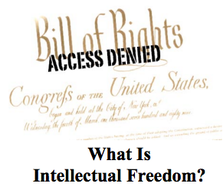5.2 Professional ethics
Candidates practice the ethical principles of their profession, advocate for intellectual freedom and privacy, and promote and model digital citizenship and responsibility.
2010 ALA/AASL Standards for Initial Preparation of School Librarians
|
“The Library is an open sanctuary. It is devoted to individual intellectual inquiry and contemplation. Its function is to provide free access to ideas and information. It is a haven of privacy, a source of both cultural and intellectual sustenance for the individual reader. Since it is thus committed to free and open inquiry on a personal basis, the Library must remain open, with access to it always guaranteed.”—Robert Vosper (1913-1994) librarian, teacher, author, & former President of the American Library Association.
The above quote is an excellent summation of a librarian’s professional ethics: upholding the free and open access to libraries, including guarding the privacy of the library user. In the course, Collection Development, SLM 506, we were asked to consider three ethical dilemmas involving intellectual freedom, privacy and confidentiality issues that a school library media specialist may face in his or her career. I wrote a one-page opinion paper on each of these scenarios with support from professional sources including journal articles, my school district’s official policies and procedures, and the American Library Association website. |
 www.ALA.org
www.ALA.org
When looking over this assignment, I went back to the textbook to review the scenario choices. In each scenario, it is possible to see the motivation of the persons involved. Whenever my ideas are in opposition to another person’s, I try to assume their heart is in the right place and try to understand why they are doing whatever they are doing. When you understand another’s true motivation, it is easier to find a compromise or to explain the background of the situation, including your own opinion. Thanking the person for trying to do the right thing is always a helpful first step in de-escalation of a conflict; after that, having documentation, data, policies, and procedures to back up your position is vital. I am fortunate to be working in a county that has clear procedures in place. For example, if a parent questions a book on the shelf, there are steps the parent may take through the county to have the book examined for age appropriateness. I would also have professional reviews and/or curriculum connections to defend the selection.
I remember this assignment making me nervous when I first completed it at the very beginning of my school librarianship coursework. I had not ever considered the library to be a controversial place! Censorship was something that happened in other countries to control thought. I learned there are much more subtle ways to censor and restrict access. During my practicum, a mother came in to ask that her child not be allowed to check out materials because she had lost a book. The parents had paid the replacement fee resulting in restoring the student’s borrowing privileges. The parent did not want it to happen a second time. While the parent’s reaction was understandable, my mentor librarian had to be empathetic to the parent’s position while explaining the educational need for free and unrestricted access to information.
I have grown a great deal throughout this program in my leadership skills – particularly honing my ability to listen to other’s viewpoints and unscramble confusion with clear communication. For multiple courses in this program, we collaboratively developed Freedom to Read, Privacy, Ethical Use of Information, and Copyright Information policy statements. I have developed a clear understanding on the ethics of librarianship. I feel confident that I will be able to explain and model these ethics to others. With my understanding of the positions of the American Library Association and American Association of School Librarians as well as my school district and fellow school library media specialist behind me, I do not feel I will ever be alone in holding up the ethics of the profession.
I remember this assignment making me nervous when I first completed it at the very beginning of my school librarianship coursework. I had not ever considered the library to be a controversial place! Censorship was something that happened in other countries to control thought. I learned there are much more subtle ways to censor and restrict access. During my practicum, a mother came in to ask that her child not be allowed to check out materials because she had lost a book. The parents had paid the replacement fee resulting in restoring the student’s borrowing privileges. The parent did not want it to happen a second time. While the parent’s reaction was understandable, my mentor librarian had to be empathetic to the parent’s position while explaining the educational need for free and unrestricted access to information.
I have grown a great deal throughout this program in my leadership skills – particularly honing my ability to listen to other’s viewpoints and unscramble confusion with clear communication. For multiple courses in this program, we collaboratively developed Freedom to Read, Privacy, Ethical Use of Information, and Copyright Information policy statements. I have developed a clear understanding on the ethics of librarianship. I feel confident that I will be able to explain and model these ethics to others. With my understanding of the positions of the American Library Association and American Association of School Librarians as well as my school district and fellow school library media specialist behind me, I do not feel I will ever be alone in holding up the ethics of the profession.

This portfolio and the artifacts contained herein by Amy Soldavini are licensed under a Creative Commons Attribution-NonCommercial-ShareAlike 3.0 Unported License |
Revised July 2013
